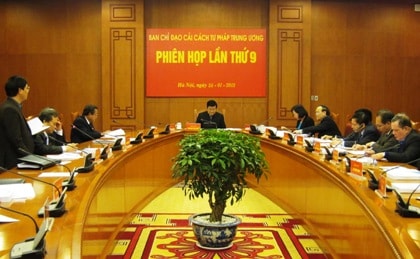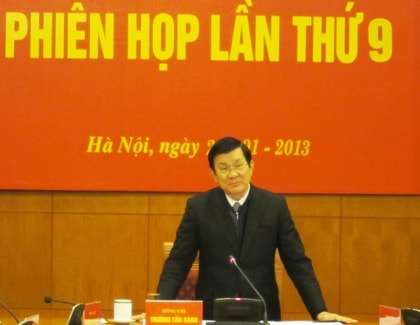9th meeting of the Central Steering Committee for Judicial Reform
On the morning of January 24, in Hanoi, the Central Steering Committee for Judicial Reform held its 9th meeting to give opinions on the Draft Report on Judicial Reform in 2012 and the key tasks of judicial reform in 2013. President Truong Tan Sang, Head of the Steering Committee for Judicial Reform, chaired the meeting.
On the morning of January 24, in Hanoi, the Central Steering Committee for Judicial Reform held its 9th meeting to give opinions on the Draft Report on Judicial Reform in 2012 and the key tasks of judicial reform in 2013. President Truong Tan Sang, Head of the Steering Committee for Judicial Reform, chaired the meeting.

9th session - Central Steering Committee for Judicial Reform. (Photo: TH).
Contributing opinions to the Draft Report on Judicial Reform (CCTP) in 2012, the majority of Steering Committee members said that: In 2012, the CCTP tasks were directed to be implemented with focus, with specific results in the following areas: Building and perfecting policies and laws; building and perfecting functions, tasks, authority, and organization of judicial and judicial support agencies; building a team of judicial and judicial support staff, international cooperation, ensuring material facilities for judicial activities; supervision activities of elected agencies on judicial work; ensuring leadership and innovation in leadership and direction methods of Party committees and organizations at all levels.
The Central Steering Committee for Reform has carried out many important tasks, researched and clarified issues with different opinions, reported to the Politburo for consideration and concluded on projects within the core tasks of the reform strategy.
However, the development and completion of judicial policies and laws are still slow; equipment, means and working conditions of judicial agencies have not been supplemented and strengthened in a timely manner, failing to meet the requirements of the fight against crime and corruption. The coordination of law-making among judicial agencies at the central level has not received due attention. The innovation of content and methods of training and fostering to improve the qualifications and capacity of judicial officers has not changed; the recruitment of officers of judicial agencies still faces many difficulties and problems that have not been overcome; the professional qualifications of a number of judicial officers have not met the requirements of corruption. The consolidation of the Steering Committee to suit the situation of changes in officers in some places has not been timely...
Based on the results of 2012, the members of the Steering Committee basically agreed on the key tasks of the 2013 CCTP work: Continue to develop and perfect policies and laws to institutionalize guidelines and orientations on CCTP; develop detailed projects on innovation in the organization and operation of judicial agencies; improve the organization and operation of judicial support agencies and organizations and other agencies assigned to perform judicial tasks; strengthen solutions to improve the quality and effectiveness of litigation activities, limit injustice, mistakes, and omission of criminals and criminals; thoroughly resolve urgent, prolonged cases, and cases that have been backlogged beyond the legal deadline; actively fight, prevent and combat negativity in judicial activities; At the same time, continue to innovate the content and methods of training and fostering judicial staff to improve the professional qualifications, political qualities, and professional ethics of judicial staff, especially those holding judicial titles; continue to lead and direct the consolidation and expansion of international cooperation in the judicial field.

President Truong Tan Sang gave a speech at the meeting.
(Photo: TH)
Concluding the meeting, President Truong Tan Sang affirmed: The work of judicial reform in 2012 has had many positive changes with the attention and leadership of Party committees and organizations in judicial agencies and localities. Accordingly, a number of important projects have been considered; the judicial sector has made an important contribution to amending the 1992 Constitution. A number of laws related to judicial reform have also been given importance; the authority of functional agencies in the judicial sector has been improved; the building of judicial staff and infrastructure has been given attention; international cooperation has been strengthened...
However, according to the President, there are still limitations and weaknesses that need to be overcome in the coming time, such as: The implementation of the law in general, including the CCTP in some areas, has not yet been put into practice. Some policies and orientations on CCTP stated in Resolution 49-NQ/TW of the Politburo on the CCTP Strategy to 2020 have not yet been institutionalized in a timely manner; some specialized projects are of limited quality, do not meet requirements, and need to be revised and supplemented many times...
Assessing the activities of the CCTP Steering Committee in 2012, President Truong Tan Sang said that, in general, the Steering Committee has made great efforts to closely follow the program set out at the beginning of the year, bringing about certain results. On that basis, it helped the Politburo to conclude a number of issues regarding piloting bailiffs, training judicial staff, etc. However, because the members of the Steering Committee had to perform concurrent duties, their activities were not regular; some topics in the Project were slow to be implemented.
Regarding the tasks of judicial reform in 2013, President Truong Tan Sang suggested that it is necessary to continue participating in the Draft Amendments and Supplements to the 1992 Constitution, focusing on contents related to judicial reform; reviewing Resolution 49-NQ/TW of the Politburo; improving the quality of the topics; organizing working groups to inspect, survey, and grasp the implementation of judicial reform tasks in sectors and localities.../.
It is expected that in 2013, the Central Steering Committee for Criminal Justice will hold 5 meetings to discuss projects related to the activities, organization, facilities, and staff of the People's Court and People's Procuracy; the establishment of 4-level People's Courts and People's Procuracy and specialized courts in the People's Court system; reorganizing the system of investigation agencies in the direction of reducing focal points; developing the team of lawyers, unifying the management of judgment enforcement work, and fighting against negativity in judicial activities; summarizing the work in 2013, key tasks and the Steering Committee's Work Program in 2014./.
According to (CPV) – LT






